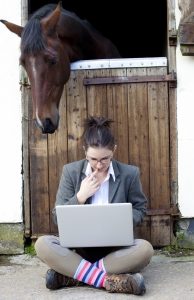There are times when we all need advice, and most people in the horse world are generous about giving it. Unfortunately, that sometimes causes more problems than it solves.
The old carrots controversy is back in circulation, with some people worried that if they feed more than two carrots per feed, their horses will overload on sugar. They won’t, unless they’re feeding large quantities of dried carrots.
A carrot comprises 80% water. The 20% dry matter might have a relatively high sugar

content, but when you look at the overall picture, a fresh carrot is low in sugar. Unless you’re planning to feed your horse a whole sack of carrots with every feed, stop worrying and let him enjoy them.
In this case, misconceptions lead to nothing more than misplaced anxiety. But it does highlight why it’s important to get advice from the right sources – and why qualified advice is worth its weight in gold, even if you have to pay for it.
How many times have you seen anxious owners posting on internet forums or social media groups because their horse has a health issue? One of the commonest queries, usually

accompanied by a photo, seeks identification of a lump or skin growth; another is “My horse has cut himself. Does it need stitching?”
The only advice anyone should give is to tell the poster to ask his or her vet. Legally, only a vet can diagnose; the rest of us might have an idea, and we might be right, but we shouldn’t presume to tell others how to treat their animals. That definitely applies to those who suggest that the best treatment for a sarcoid is to apply toothpaste, but that’s another story.
The main reason so many owners turn to the internet as a first resource may be that the information isn’t accompanied by a call-out fee and a bill. The fact that they may end up with a bigger problem and a bigger bill doesn’t seem to occur to them.
Another possible explanation is the assumption that professional equals scary. But if you have a good relationship with your vet, you should be able to talk to him or her and expect explanations in plain English. We’ve come a long way since the days when all vets were

bombastic autocrats, as portrayed by the late Robert Hardy in the BBC adaptation of All Creatures Great and Small.
Similarly, reputable equine nutrition companies have experts who can offer free, qualified advice. Fair enough, it will reference their own products, but they should be talking in terms of principles and good practice and basing their advice on the same. There’s also nothing to stop you talking to more than one company and checking that the principles recommended have common denominators.
It’s good to have an inquiring mind and a thirst for knowledge and it’s good to share stories and opinions. But when it really matters, make sure the opinions come from the right sources – and keep feeding the carrots.
 content, but when you look at the overall picture, a fresh carrot is low in sugar. Unless you’re planning to feed your horse a whole sack of carrots with every feed, stop worrying and let him enjoy them.
In this case, misconceptions lead to nothing more than misplaced anxiety. But it does highlight why it’s important to get advice from the right sources – and why qualified advice is worth its weight in gold, even if you have to pay for it.
How many times have you seen anxious owners posting on internet forums or social media groups because their horse has a health issue? One of the commonest queries, usually
content, but when you look at the overall picture, a fresh carrot is low in sugar. Unless you’re planning to feed your horse a whole sack of carrots with every feed, stop worrying and let him enjoy them.
In this case, misconceptions lead to nothing more than misplaced anxiety. But it does highlight why it’s important to get advice from the right sources – and why qualified advice is worth its weight in gold, even if you have to pay for it.
How many times have you seen anxious owners posting on internet forums or social media groups because their horse has a health issue? One of the commonest queries, usually  accompanied by a photo, seeks identification of a lump or skin growth; another is “My horse has cut himself. Does it need stitching?”
The only advice anyone should give is to tell the poster to ask his or her vet. Legally, only a vet can diagnose; the rest of us might have an idea, and we might be right, but we shouldn’t presume to tell others how to treat their animals. That definitely applies to those who suggest that the best treatment for a sarcoid is to apply toothpaste, but that’s another story.
The main reason so many owners turn to the internet as a first resource may be that the information isn’t accompanied by a call-out fee and a bill. The fact that they may end up with a bigger problem and a bigger bill doesn’t seem to occur to them.
Another possible explanation is the assumption that professional equals scary. But if you have a good relationship with your vet, you should be able to talk to him or her and expect explanations in plain English. We’ve come a long way since the days when all vets were
accompanied by a photo, seeks identification of a lump or skin growth; another is “My horse has cut himself. Does it need stitching?”
The only advice anyone should give is to tell the poster to ask his or her vet. Legally, only a vet can diagnose; the rest of us might have an idea, and we might be right, but we shouldn’t presume to tell others how to treat their animals. That definitely applies to those who suggest that the best treatment for a sarcoid is to apply toothpaste, but that’s another story.
The main reason so many owners turn to the internet as a first resource may be that the information isn’t accompanied by a call-out fee and a bill. The fact that they may end up with a bigger problem and a bigger bill doesn’t seem to occur to them.
Another possible explanation is the assumption that professional equals scary. But if you have a good relationship with your vet, you should be able to talk to him or her and expect explanations in plain English. We’ve come a long way since the days when all vets were
 bombastic autocrats, as portrayed by the late Robert Hardy in the BBC adaptation of All Creatures Great and Small.
Similarly, reputable equine nutrition companies have experts who can offer free, qualified advice. Fair enough, it will reference their own products, but they should be talking in terms of principles and good practice and basing their advice on the same. There’s also nothing to stop you talking to more than one company and checking that the principles recommended have common denominators.
It’s good to have an inquiring mind and a thirst for knowledge and it’s good to share stories and opinions. But when it really matters, make sure the opinions come from the right sources – and keep feeding the carrots.
bombastic autocrats, as portrayed by the late Robert Hardy in the BBC adaptation of All Creatures Great and Small.
Similarly, reputable equine nutrition companies have experts who can offer free, qualified advice. Fair enough, it will reference their own products, but they should be talking in terms of principles and good practice and basing their advice on the same. There’s also nothing to stop you talking to more than one company and checking that the principles recommended have common denominators.
It’s good to have an inquiring mind and a thirst for knowledge and it’s good to share stories and opinions. But when it really matters, make sure the opinions come from the right sources – and keep feeding the carrots.











